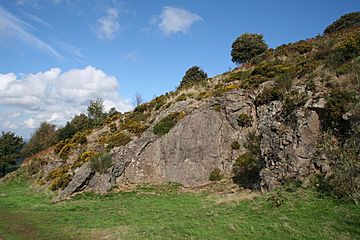Table Hill facts for kids
Quick facts for kids Table Hill |
|
|---|---|

Quarry on Table Hill
|
|
| Highest point | |
| Elevation | 373 m (1,224 ft) |
| Prominence | c. 337 metres (1,106 ft) |
| Parent peak | Worcestershire Beacon |
| Geography | |
| Location | Malvern Hills, England |
| Topo map | OS Landranger 150 |
| Geology | |
| Age of rock | Pre-Cambrian |
| Mountain type | Igneous, Metamorphic |
| Climbing | |
| Easiest route | Hiking |
Table Hill is a cool spot in the Malvern Hills range. These hills stretch about 13 kilometers (8 miles) between Herefordshire and Worcestershire in England. Table Hill sits right between North Hill and Sugarloaf Hill. It stands tall at 373 meters (1,224 feet) above sea level.
Discovering Table Hill's Past
Table Hill has a long and interesting history. People have been exploring these hills for thousands of years!
Ancient Tools and Traders
Long ago, people traveled across the Malvern Hills. Even though a main path for trading flint (a type of stone) was further north, some traders still passed through this area. We know this because archaeologists have found old tools here.
They discovered parts of an arrowhead, a scraper, and flint flakes. These items were found between North Hill and Table Hill. An arrowhead is the sharp tip of an arrow. A scraper is a tool used to clean animal hides. Flint flakes are small pieces of flint that broke off when tools were made.
Mysterious Mounds and Markings
In the 1800s, a travel guide mentioned some interesting features on these hills. It talked about a collapsed burial mound on North Hill, which was called the "Giant's Grave." A burial mound is a large pile of earth or stones built over a grave.
The guide also described a similar mound, or "tump," on Table Hill. These mounds might have been connected to an ancient settlement of the Dobunni people in a nearby village called Mathon.
The old guidebook even described a unique marking on Table Hill:
Upon the Table Hill you will perceive the figure of a large table, whence the name is derived. In the centre is a cross, of the same size as that by the Giant's Grave, upon North Hill.
This means Table Hill might have gotten its name from a flat, table-like shape or marking on its top.
 | Precious Adams |
 | Lauren Anderson |
 | Janet Collins |

